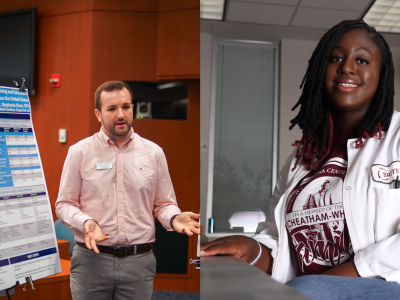February 6, 2023
 The National Institutes of Health (NIH) has awarded UNC Eshelman School of Pharmacy Professor Kristy Ainslie, Ph.D., chair of the Division of Pharmacoengineering and Molecular Pharmaceutics with a five-year grant to develop a new vaccine to treat orthopoxviruses.
The National Institutes of Health (NIH) has awarded UNC Eshelman School of Pharmacy Professor Kristy Ainslie, Ph.D., chair of the Division of Pharmacoengineering and Molecular Pharmaceutics with a five-year grant to develop a new vaccine to treat orthopoxviruses.
The NIH is providing over $3.2 million dollars of funding toward Ainslie’s project “Mechanistic evaluation of mast cell agonists combined with TLR, NOD and STING agonists.”
Orthopoxvirus is a genus of virus that include smallpox and other animal pox like monkey pox and rabbit pox. The current vaccine is a live virus, which cannot be given to people with a weakened immune system. This includes individuals such as infants, people with HIV+, cancer and autoimmune disease, where receiving a live virus vaccine may result in an infection from the vaccine.
As a response, Ainslie and her team are focused on developing a safer protein-based subunit vaccine. Subunit vaccines are different from live virus vaccines because they only contain specific components of the virus that serve as antigens. However, protein-based subunit vaccines often need an adjuvant, which will help jump start the immune system towards the protein to generate a protective response. Using this knowledge, Ainslie and her team have decided to put two types of adjuvants together to create the optimum vaccine to prevent orthopox infection.
For this project, Ainslie is partnering with Roland Tisch, Ph.D., professor of microbiology and immunology at the UNC School of Medicine and Mark Heise, Ph.D., professor of genetics at the UNC School of Medicine.
“The current focus of our work is preclinical development,” said Ainslie, a Fred Eshelman Distinguished Professor. “Even with our progress, it would be 15 years or more before it could move into humans.”
Ainslie speculates that combining commonly used adjuvants with a mast cell agonist could be the key to creating a safe and effective vaccine. Mast cells are immune cells that are usually linked to allergies and anaphylactic shock but can also help prevent infections. The team is collaborating with Herman Staats, Ph.D., professor of pathology at the Duke University School of Medicine and Soman Abraham, Ph.D., the Grace Kerby distinguished professor of pathology at the Duke University School of Medicine. They have developed small molecule mast cell agonists that Ainslie’s team is combining with other adjuvants and an orthopox protein to form a vaccine against orthopoxviruses.
Ainslie’s team is needed to deliver these adjuvants since the human body is water-based, and these small molecule adjuvants dislike water (hydrophobic) and therefore do not distribute well in the body. To deliver these molecules better, Ainslie and her team developed a polymer known as acetalated dextran, or Ace-DEX for short. Ace-DEX is a bio-degradable acid-sensitive polymer that when formed into microparticles about the size of bacteria can passively target immune cells to generate a strong vaccine response. The goal is to create an Ace-DEX formulated subunit vaccine for orthopoxviruses that will contain a conventional adjuvant with a small molecule mast cell agonist.
Despite the work ahead, the team is grateful for the support from the NIH. “This funding helps me support and train graduate students, post-doctoral students and undergraduate students to help with this project,” said Ainslie. “We hope that we will soon develop a novel adjuvant system that can safely generate potent protective responses in a subunit vaccine.”
Latest News

Early Assurance Program inspires students from small towns

Rural Health Scholars dream to make a difference


